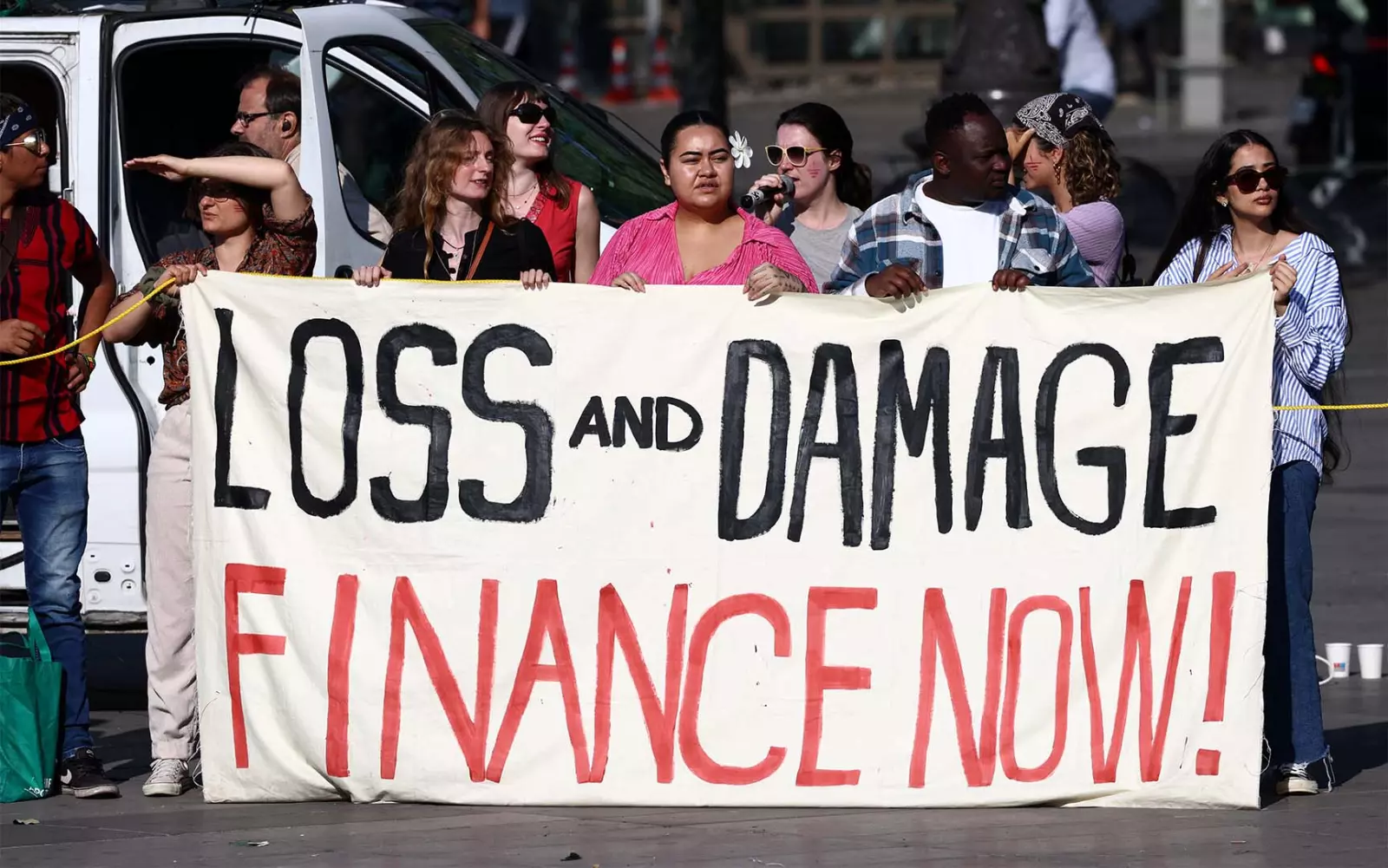 By Dalila Loudyi, Association Démocratique des Femmes du Maroc
By Dalila Loudyi, Association Démocratique des Femmes du Maroc
A hard yet right genesis:
One of the key issues that were watched by observer organizations, particularly non-governmental organizations (NGOs) and intergovernmental organizations (IGOs) in COP28 is certainly the loss and damage Fund. Indeed, this fund was very controversial when it was brought to forefront in COP26 by developing countries, including island states, claiming to receive support and funding to help communities threatened by climate change severe impacts leading to devastating losses of lives, land and livelihoods. Some damages are permanent, such as destroyed communities, species that disappear or water resources that dry up. Therefore, vulnerable nations should receive support and funding to come up with these adverse impacts.
However, developing countries have always resisted this idea, fearing being forced to pay compensation due to their historical responsibility for climate change. Inevitably, financing loss and damages was arguably one of the most contentious issues at COP 27 and was not resolved until very late in the conference. Following arduous negotiations between the parties, the countries agreed for the first time to recognize the need for financing to respond to the losses associated with the harmful effects of climate change and set up a fund dedicated to loss and damage as well as necessary financing arrangements, with the details to be worked out in 2023.
A Fund well shaped but loosely defined
The purpose of the Fund is to assist developing countries that are particularly vulnerable to the adverse effects of climate change in responding to economic and non-economic loss and damage associated with these effects. This support may include funding that is complementary to humanitarian actions taken immediately after an extreme weather event; funding for intermediate or long-term recovery, reconstruction or rehabilitation; and funding for actions that address slow onset even. The fund may also support developing national response plans; addressing insufficient climate information and data; and promoting equitable, safe and dignified human mobility in the form of displacement, relocation and migration in cases of temporary and permanent loss and damage.
- The Fund should be scalable and flexible; strive to maximize the impact of its funding for responding to loss and damage associated with the adverse effects of climate change while promoting environmental, social, economic and development co-benefits; and take a culturally sensitive and gender-responsive approach.
Hence, the main outcomes of COP28 decision (FCCC/CP/2023/L.1−FCCC/PA/CMA/2023/L.1) related to the operationalization of the funding arrangements for responding to loss and damage, including the fund are:
1- Governance:
- The Fund will be governed and supervised by a Board that will comprise 26 members, as follows: 12 members from developed countries; 3 members from Asia-Pacific States; 3 members from African States; 3 members from Latin American and Caribbean States; 2 members from small island developing States (SIDS); 2 members from the least developed countries (LDC); 1 member from a developing country not included in the regional groups and constituencies. The Board will enhance the engagement of stakeholders by inviting active observers, including youth, women, Indigenous Peoples and environmental non-governmental organizations, to participate in its meetings and related proceedings.
- The fund will be serviced by a new, dedicated, and independent secretariat, and governed and supervised by the board.
- Nominations for membership in the board should be done immediately as the Secretariat is requested to convene the first Board meeting no later than 31 January 2024;
- The Board of the fund will be conferred with legal capacity to negotiate, conclude, and enter into a hosting arrangement with the World Bank as interim trustee and host of the fund’s secretariat;
- The board is also requested to select its host country through an open, transparent, and competitive process.
2- Eligibility:
- Developing countries that are particularly vulnerable to the adverse effects of climate change are eligible to receive resources from the Fund.
- The Fund will develop simplified procedures and criteria for fast-tracked screening to determine functional equivalency with internationally recognized standards of national and/or regional funding entities’ safeguards and standards.
- The annexed Governing Instrument of the fund, among others, specifies that the fund’s board will develop and operate a dynamic resource allocation system that will take into account, inter alia:
- the needs and priorities of particularly vulnerable developing countries;
- the scale of impacts;
- safeguards against overconcentration of support;
- best available information;
- cost estimates; and
- a minimum percentage allocation floor for least developed country (LDCs) and mall Island Developing States (SIDS).
3- Types of funding:
- The Fund will provide financing in the form of grants and highly concessional loans on the basis of the Board’s policy for the provision of grants, concessional resources and other financial instruments, modalities and facilities.
- In its provision of finance, the Fund will make use of, inter alia, triggers, climate impact relevant indicators, debt sustainability considerations and criteria developed by the Board.
3- Institutional roles:
- The World bank: the decision invites the World Bank to operationalize the Fund as a World Bank-hosted financial intermediary fund for an interim period of four years, starting from the sessions of the COP and CMA at which the board of the fund confirms the conditions referred to in the decision can be met, with the Fund to be serviced by a new, dedicated, and independent secretariat hosted by the World Bank.
- Developed countries: Developed countries committed roughly USD 700 million to the Fund or to related funding arrangements. The Santiago Network’s institutional home was settled, placing it with the UN Offices for Disaster Risk Reduction and for Project Services. The decision urged developed countries to continue to provide support and encourage other parties to provide, or continue to provide support, on a voluntary basis, for activities to address loss and damage.
Expected steps forward for funding equity
It is true that the loss and damage Fund related COP28 decisions have set a good foundation for the implementation of the Fund. However, it is clear that much work is still to be done. The following points are suggestions of ways to make the fund evolve in a fair and equitable way, not to leave any community behind:
- At governance level, the role of NGOs as observers should be reinforced by enabling instruments for monitoring and reporting on the Fund management and its impacts.
- Developing countries accepted that the World Bank would host the new fund on a temporary basis. However, later they expressed growing reservations about the ideological influence of the United States on the World Bank and thus on the Fund implementation.
- The eligibility criteria are still loose and should be established to reflect vulnerability of communities in an equitable manner without creating any competitiveness on how vulnerable they are.
- Commitments of developing countries to the fund should be remotely evaluated and enhanced as the needs for urgent actions to compensate loss and damages are high and considered as a legitimate instrument for establishing climate justice. A clear finance mobilization scale should also be defined by developed countries to take their financial responsibilities and reach the Fund goals.
In conclusion, COP28’s decision to operationalize the Loss and Damage Fund is a positive step in addressing climate impacts. Concerns include the World Bank’s interim hosting, lack of defined replenishment, and the need for clear financial scales. Affluent nations must fulfill financial obligations, especially for a just phase-out of fossil fuels. Urgency is emphasized due to record climate impacts. Immediate action is urged to end fossil fuel expansion and redirect funds to renewables. Rich nations, notably the U.S., must provide robust resources for the Fund. COP28’s decisions are crucial, but ongoing commitment is essential for a sustainable and equitable future.


